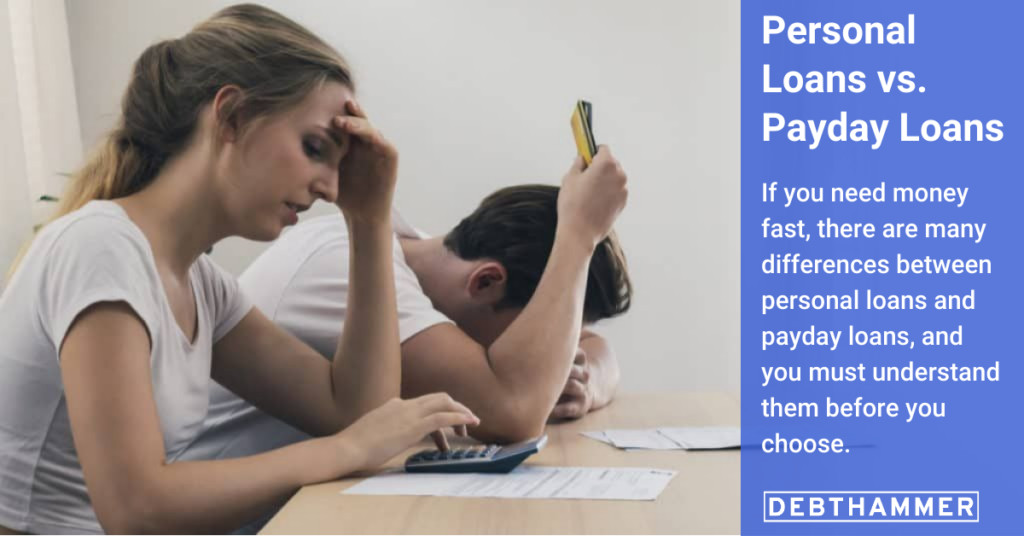When you need to borrow money quickly, you may not have time to extensively research the different types of available loans.
What are the differences between payday loans and personal loans? The truth is that personal loans will almost always be better.
Stuck in payday debt?
DebtHammer may be able to help.
Table of Contents
At a glance: Payday loans vs. personal loans
| Payday loans | Personal loans |
| Small loans, usually $1,000 or less | Borrow between $500 to $50,000 |
| Are repaid on your next payday | Are repaid in fixed installments over time |
| Have interest rates higher than 300% APR | Interest rates can range from about 6% to 36% APR, or even higher if you have bad credit |
| Have no credit score requirement | Many lenders require a minimum credit score of 600 |
| They’re easy to get | Have more eligibility requirements |
| Are unsecured loans | Have both unsecured and secured loan options |
| On-time payments won’t help build credit | Payments will help you boost your credit score |
| Lump-sum payments are difficult to manage | Fixed monthly payments are easier to repay |
| Available at payday loan storefronts and from online lenders | Available from banks, credit unions and online lenders |
| Are illegal in 18 states | Are available in every state |
| Lots of scammers | Lots of scammers |
Key differences
- Payday loans: These are short-term, high-interest, low-limit loan amounts, usually around $500, that help cover immediate, emergency cash needs that are meant to be repaid at your next paycheck. The interest rate on these loans averages 391% for a 14-day loan.
- Personal loans: These are more traditional loans from a bank, credit union, or online lender. These loans are larger, usually between $500 to $50,000, and are issued in a lump sum and deposited into your bank account. It is repaid in fixed monthly payments, usually over two to seven years. Personal loans can be secured or unsecured loans. Personal loan interest rates usually range from about 6% to 36%, but read the fine print on your loan application carefully.
Qualifications
| Payday loans: Requirements are minimal | Personal loans: In addition to all payday loan requirements, lenders consider: |
| Applicant must be at least 18 | Credit scores |
| Have a government-issued ID or Social Security number | Income |
| Have a steady job or another source of income | Work history |
| Have a bank account | Assets |
| Debt-to-income ratio |
Credit check
- Payday loans: Have no credit score requirement. Payday loan lenders won’t check your credit report with the three major credit bureaus, so you’ll still qualify even if you have bad credit or your credit score is less than perfect.
- Personal loans: Most require a minimum credit score of 600, but there are a few lenders with no minimum credit score requirement at all. Still, approval will be challenging if you have a bankruptcy or charge-off on your credit report.
Accessibility
- Payday loans: Fast and easy, but the convenience comes at a high cost.
- Personal loans: Are available from traditional financial institutions, credit unions and countless online lenders.
Credit-score impact
- Payday loans: Payday lenders don’t report loans to the major credit bureaus, so they won’t help you build credit. But if you fail to repay your loan as scheduled, they could significantly hurt your credit.
- Personal loans: They will help you improve your credit score – as long as you make your payments on time.
Loan cost
- Payday loans: They’re expensive, because the fees are very high compared to the small loan amounts. Interest rates can range from 391% to over 600%. Repayment on the next payday makes it challenging to come up with enough money to repay the total amount of the loan as scheduled, creating a debt trap for the borrower.
- Personal loans: Usually have lower interest rates, maxing out at 36% APR, though some loans for bad credit borrowers can have higher interest rates.
Fees
- Payday loans: Charge a fee averaging from $10 to $30 for every $100 borrowed. A $15 fee equals an APR of 391%.
- Personal loans: Can tack on an “origination fee” ranging from 1% to 6% of the total loan amount. If you choose to pay your loan off early, you may have to pay a pre-payment penalty fee ranging from 2% to 5% of the loan amount. Late payment frees can range from $25 to $50 or 3% to 5% of your monthly payment.
Scam risk
- High for both: Scammers know that people who need a fast loan are desperate, and they take advantage of that. There are plenty of schemes targeting people who need cash now. This even includes mailing unsolicited checks that, if cashed, are actually high-interest personal loans. You can ensure that your personal loan is legitimate by going through a bank, credit union or reputable online lender.
Don’t trust anyone who offers you a loan by phone, mail or email. If you’re truly interested in the loan, write down the caller’s name and the company represented, then call the company directly through the main customer service number.
Pro tip: Both payday and personal loans can sometimes be tribal loans in disguise. Be careful and make sure that your lender is appropriately licensed in your state.
According to the Federal Trade Commission, about $3.3 billion was lost in loan fraud in 2020. It isn’t always easy to identify a scammer because many have devoted a lot of time and resources to their sales pitch in order to make it sound legitimate. Protect yourself by learning the warning signs.
READ MORE: What is a tribal payday loan?
Payday loans or personal loans: Which is better?
An unsecured personal loan will almost always be better than a payday loan. With payday loans averaging 400% APR, any loan is better than a payday loan. And payday loans lead to regret. About 93% of payday loan borrowers end up regretting their original payday loan. The only exception would be when you know you have a payment on the way within days (a tax refund, for example) and you have an emergency expense that cannot wait. Otherwise, a personal loan will always be a safer option.
Pro tip: The only time a payday loan might be better is when you are 100% certain that you will have the money available in two weeks to repay the loan in full. For example, if you’re waiting for an insurance payment and need to have your car repaired immediately. Even then, you should only consider a payday loan if you don’t have access to a credit card, or your credit card is maxed out.
Better types of loan options for borrowers with bad credit
- Cash advance apps
- Payday Alternative Loan (PALs)
- Debt consolidation loans
- Credit card
- Home equity loan or home equity line of credit
The bottom line
A payday loan is a temporary, last-resort solution to an underlying financial problem, and you should do whatever you can to avoid getting stuck in the payday loan debt trap.
A personal loan can not only help you through an immediate crisis, but it can also help you address your underlying financial issue to escape the debt trap for good. Start building your credit score by signing up for a free service like Experian Boost. That way, the next time an emergency arises, you’ll have plenty of better borrowing options.


